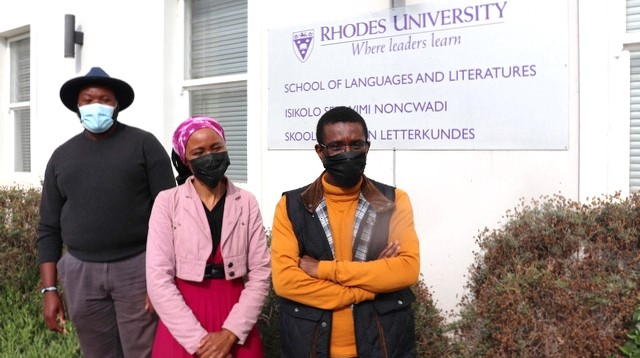To revive and preserve indigenous African languages, Rhodes University has joined a consortium of universities to collaborate in a project funded by the European Union called BAQONDE. The name stands for Boosting the use of African languages in education: A Qualified Organized National DEvelopment strategy for South Africa. Other universities involved in the project are: North-West University, University of KwaZulu-Natal, University of the Western Cape from South Africa and three European institutions of higher learning: Salamanca University, Trinity College Dublin & University of Groningen. The word “baqonde” means “(let them) understand” in the Nguni languages.
Department of Higher Education and Training (DHET) Chief Director of University Policy and Development Support, Mahlubi Mabizela, said: “Undoubtedly, the BAQONDE project with its aim to facilitate and promote the use of indigenous African languages as mediums of instruction at higher education institutions in South Africa advances the objectives of the Language Policy Framework for Public Higher Education Institutions. The BAQONDE project is leading us towards restoring dignity and parity of esteem for our indigenous languages, and that is commendable indeed. This is very encouraging and is the kind of enthusiastic response we hope can be emulated by other institutions.”
Rhodes University’s African Languages Associate Professor Dion Nkomo said since the project started at the beginning of the year, they have managed to invite interest from academics for collaboration, and it has been overwhelming. “Our academics in various departments have already been involved in multilingual teaching and developing resources in African languages. Over the years, academics in African Languages have collaborated in this regard with academics in Politics and International Relations, Economics, Drama, Pharmacy and Education, among others,” he said.
Professor Nkomo said as part of this project, the University will be establishing a Rhodes University African Languages Development Unit (RUALDU), which will contribute towards implementing the University’s language policy. He said training of academics and tutors on multilingual pedagogies would be on top of the agenda.
He said the establishment of RUALDU is the main focus for this first year of the project. The University has already initiated a process of the establishment of a Centre for Multilingualism. In its recent meeting of 10 June 2021, the University Council approved the formal proposal to establish this Unit in line with the University’s Research and Scholarship Entities Framework adopted in 2009. “The funders have approved our equipment list and budget. We are in the process of procuring the relevant equipment which will enable the production of multilingual audio-visual and sub-titled lectures, multilingual annotations on key readings available in PDF format and multilingual glossaries, in addition to the usual translation of teaching materials such as course outlines, readings and assessments,” added Professor Nkomo.
Professor Nkomo said he hopes that RUALDU will serve as a foundation for the envisaged Centre, which should institutionalise and sustain multilingualism as an institutional priority in line with the Institutional Transformation Plan.
Professor Nkomo is working with Dr’s Bulelwa Nosilela and Hleze Kunju in leading this project. Deputy Vice-Chancellor for Academic and Student Affairs, Dr ‘Mabokang Monnapula-Mapesela, has been appointed to serve in the BAQONDE Project Board, which is constituted by the Vice-Chancellors and Deputy Vice-Chancellors of the seven collaborating institutions of higher learning. The project will run for three years till 2023.
Linked to BAQONDE work is the translation of Decolonising the Mind, an important text on the advancement of African languages for knowledge and artistic production by Ngũgĩ wa Thing’o into selected African languages. This is a project of the National Research Foundation SARChI Chair: Intellectualisation of African Languages, Multilingualism and Education at Rhodes, being undertaken in collaboration with colleagues from Nelson Mandela University, University of KwaZulu-Natal, the University of Cape Town, the University of Pretoria, Lupane State University from Zimbabwe, the University of Zimbabwe and the South Eastern Kenya University. The languages that have been chosen so far are isiXhosa, isiZulu, Sesotho, isiNdebele of Zimbabwe and Kiswahili. The translated texts are earmarked for publication in 2021. So far, the text is available in only one African language, i.e. ChiShona of Zimbabwe (produced by Dr John Mambambo, a Postdoctoral Fellow at Rhodes University School of Languages & Literatures). However, translations of the texts already exist in several European languages.



